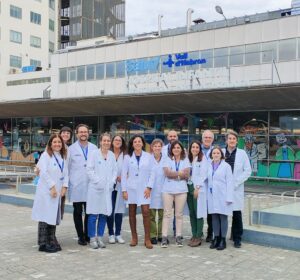In this work we analyzed the frequency, actionability and psychological impact of disclosing pathogenic variants in cancer susceptibility genes (CSG) as a secondary or incidental finding (SF/IF) mainly in pediatric patients. In a total of 533 exomes examined for non-cancer indications, we found a pathogenic variant in a CSG as a SF/IF in 2%. Around 80% of the families did not have a cancer family history. Among those eligible for cancer surveillance, we detected a tumour in 20% in the first set of investigations.Regarding the psychological impact, we found higher scores in the MICRA scale among carriers of a CSG as a SF/IF compared to carriers of a CSG due to familial cancer history. Genetic counseling is key in individuals undergoing exome sequencing in order to cope with medical and psychological implications of their results (By Estela Carrasco, https://jmg.bmj.com/content/early/2022/11/28/jmg-2022-108929 )
Estela Carrasco (the girl with brown trousers and boots) and some coathors
